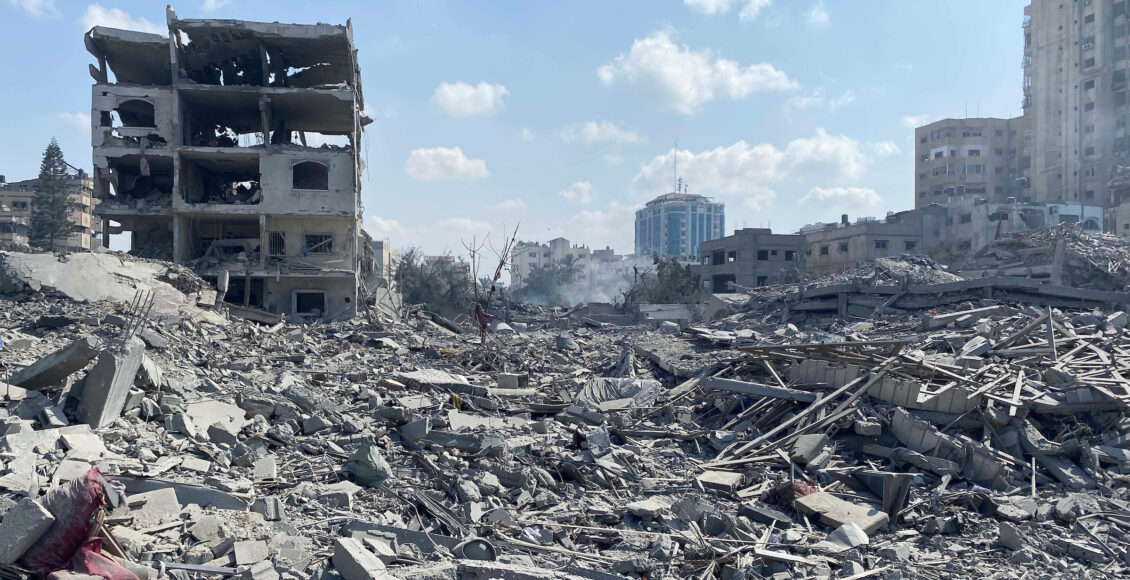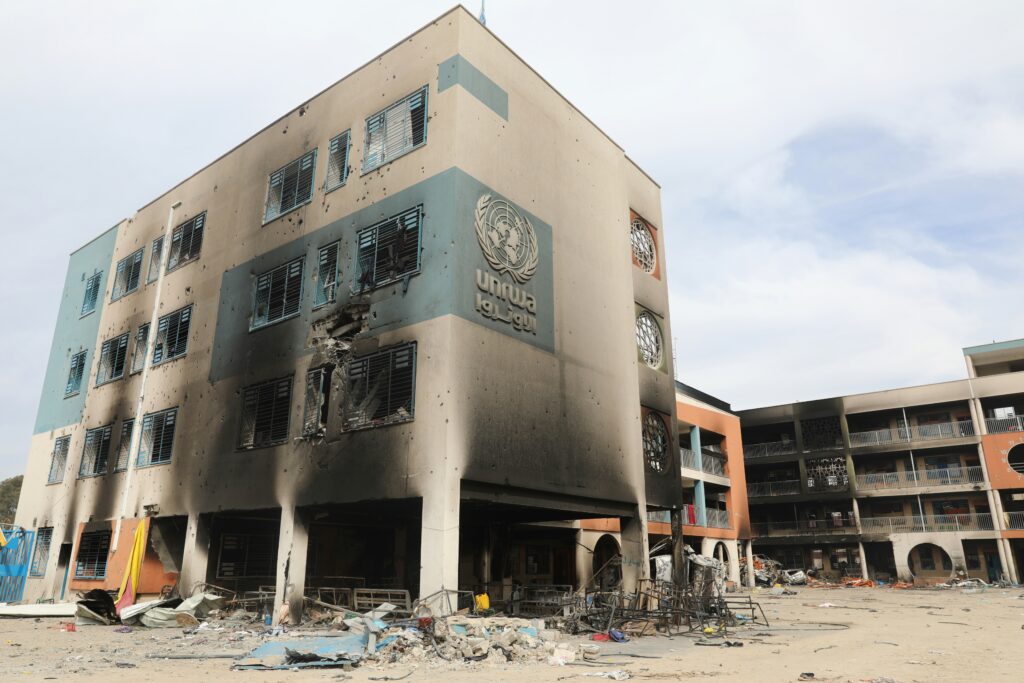Gaza and Global Terrorism: What’s at Stake for American National Security?

Hala Rharrit, the first senior American diplomat to resign from the State Department over the Biden administration’s policies on the war in Gaza, maintained that America’s unconditional support for Israel’s genocide was not only immoral — it was dangerous for American national security. Prior to her resignation on April 24, 2024, Rharrit served as the Arabic Language Spokesperson and the Dubai Regional Media Hub’s Deputy Director. She reported to the State Department on how pan-Arab media were covering the war in Gaza, which included “images that were going viral all over the Arab world of children being massacred, oftentimes showing US complicity with fragments of US bomb.” In January 2024, she was asked to stop sending those reports.
The Biden administration’s policy on Gaza failed morally and strategically, but President Donald Trump’s calls to ethnically cleanse Gaza of Palestinians, transform the enclave into the “Riviera of the Middle East,” and potentially back Israel’s annexation of the West Bank promise even greater blowback. The impacts of the war in Gaza on global terrorism seem of secondary concern to the Trump administration, exposing a shortsightedness that compromises American national security. Rharrit’s warnings have plainly fallen on deaf ears, begging the crucial questions: how is the war in Gaza impacting global terrorism, and what does this mean for American national security?
The New Year’s Day terror attack in New Orleans, US, appears to have little connection to Gaza, but analysis from former US Director of the National Counterterrorism Center (NCTC), Brett Holmgren, suggests that the reality is more complex, and that the New Orleans attack instantiates the growing threat of domestic terrorism facing the US. Shamsud-Din Jabbar, the perpetrator of the attack, was a homegrown violent extremist (HVE) who pledged bayat, an oath of allegiance, to the Islamic State of Iraq and al-Sham (ISIS) in the hours before the attack. HVEs are domestic terrorists who are “inspired, enabled, or directed” by foreign terrorist organizations and, since 9/11, have been responsible for 45 of the 49 terror attacks perpetrated in the US.
Foreign terrorist organizations have previously sought to execute maximally deadly attacks, and with the declaration of a caliphate in parts of Syria and Iraq in 2014, foreign fighters were redeployed to their home countries to facilitate terror attacks. This popularized what’s called an enabled attack model, where perpetrators receive some guidance or support from terrorist groups, but ultimately make final decisions about methodology and targeting independently. In today’s world, foreign terrorist groups are increasingly focused on virtual recruitment, seeking to maximize the media attention an attack receives, rather than the number of casualties.
The shift towards virtual recruitment is precisely what made Hamas’ October 7 attacks and Israel’s response a boon to foreign terrorist organizations. Though the impacts have yet to be fully felt, Holmgren assesses that October 7 and the war in Gaza is likely to be “the most consequential recruiting event for just the kind of global terrorism movement we’ve seen since the Iraq war.” The war in Gaza is a “generational event,” according to the NCTC, because it broke out when groups like al-Qaeda and ISIS were at their lowest operational levels ever. As resources and attention were diverted from other conflict hotspots to the war in Gaza, the US government focused its counterterrorism efforts on attacks from Iranian-backed militant groups. ISIS exploited this diversion to rebuild, and multiple foreign terrorist groups called for greater violence against Israel and the US in the wake of Hamas’ attack. Israeli soldiers livestreaming war crimes and acts of genocide have also fuelled perceptions of injustice against Palestinians and Arabs and provided terrorist groups with a surplus of content to be used for propaganda.
As a result, since November 2024, 40 attacks or planned attacks have been linked to the October 7 attacks or the ensuing war in Gaza. While NCTC data doesn’t disaggregate between what facets of the conflict inspired which attacks, Holmgren was clear that al-Qaeda and ISIS propaganda have used images of destruction and humanitarian suffering in Gaza to recruit disaffected people to their cause. In this context, perceived indifference from Western countries to Palestinian suffering is undoubtedly contributing to alienation and radicalization amongst their populations.

Over a dozen planned or executed terror attacks in the West show clear connections to the war in Gaza, with racist, Islamophobic, or antisemitic motivations. In October 2023, a man from Michigan was charged with making a threat of terrorism after he put out an open call on social media asking if others would help him “hunt Palestinians” in Dearborn, Michigan, a Detroit suburb that has been the site of pro-Palestinian rallies. Additionally, in September 2024, Canadian authorities arrested and charged a Pakistani national with attempting to provide material support and resources to ISIS. He planned to travel to New York City and carry out a mass shooting at a Brooklyn Jewish center in support of ISIS on the one-year anniversary of the October 7 attacks. His stated motive was to kill as many Jews as possible.
Former FBI Director Christopher Ray said in August 2024 that he was “hard-pressed to think of a time in [his] career where so many different kinds of threats are all elevated at once.” The war in Gaza is, of course, just one factor driving radicalization, and how it connects with other factors to trigger extremist acts of violence varies in each case. However, counterterrorism officials maintain that the protracted crisis in the Middle East is greatly increasing the threat of terrorism being perpetrated against the US and other Western countries, within their national jurisdictions and against their presence abroad.
Effective counterterrorism operations are a large reason why the US and other Western countries haven’t seen more successful attacks perpetrated against them since October 2023. This begs the question: what would be the implications for American national security if counterterrorism and intelligence institutions were purged at the hands of Kash Patel? The newly appointed FBI Director is accused of orchestrating a purge of agency officials before assuming his post and perjuring himself during his Senate confirmation hearing. Though Trump seeks to paint himself as the leader who ends US military involvement abroad through intimidation and unilateralism, terrorist groups won’t be coerced into submission by his threats. They will capitalize on weaknesses in his foreign policy and continue to cite American imperialism as justification for their political violence, finding fuel for the fire in the ludicrous propositions to redevelop Gaza without Palestinians.

Edited by Lily Molesky and Stellar Zhang
Featured Image: “Damage in Gaza Strip during the October 2023 – 29” by WAFA: Palestinian News Agency is licensed under CC BY-SA 3.0.
